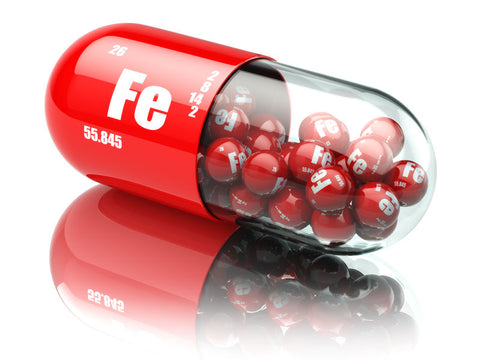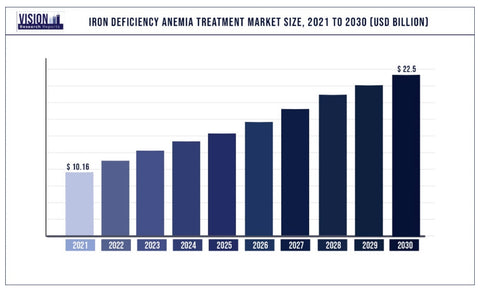Can Iron Help Female Athletes?
The Performance Enhancing Role of Iron

Iron plays a crucial role in the body, especially for women athletes, due to its involvement in oxygen transport, energy production, and muscle function. The monthly menstrual cycle affects each female athletes differently. Some females find themselves completely 'flat out' and for others it is a mini inconvenience.
We know that one symptom of blood loss contributes to the lethargic feeling and fatigue, commonly associated with the monthly cycle.
To reduce some of these symptoms, and keep energy levels higher through your cycle, a shift in eating habits and iron supplementation can help offset low energy.
Here's how iron can benefit women and female athletes:
**Oxygen Transport**
Iron is a key component of hemoglobin, the protein in red blood cells that carries oxygen from the lungs to tissues throughout the body. During exercise, muscles require more oxygen to perform efficiently. Adequate iron levels ensure that enough oxygen is transported to working muscles, enhancing endurance and performance.
**Energy Production**
Iron is also necessary for the proper functioning of enzymes involved in energy production. It helps convert carbohydrates, fats, and proteins from food into energy that muscles can use during exercise. Optimal iron levels can improve overall energy levels and prevent fatigue during workouts.
**Muscle Function**
Iron is essential for maintaining healthy muscle function. It is involved in the synthesis of myoglobin, a protein in muscle cells that stores oxygen for use during exercise. Sufficient iron levels support muscle contraction, strength, and recovery, which are vital for women athletes to perform at their best.
**Immune Function**
Intense exercise can temporarily suppress the immune system, increasing the risk of infections and illnesses, which can hinder training and performance. Iron plays a role in immune function, helping to support the body's defense mechanisms against pathogens. Ensuring adequate iron intake can help women athletes maintain a robust immune system.
**Prevention of Iron Deficiency Anemia**

Women are more prone to iron deficiency anemia due to factors such as menstruation, pregnancy, and insufficient dietary intake. Iron deficiency can impair athletic performance by causing fatigue, weakness, and decreased endurance. Regular monitoring of iron levels and maintaining adequate intake through diet or supplementation can prevent iron deficiency anemia and its negative effects on athletic performance.
A common question is: how much Iron should a female athletes take?
The amount of iron supplementation needed for a female athlete depends on various factors such as age, dietary intake, menstrual cycle, training intensity, and individual iron status. It's essential to consult with a healthcare provider or registered dietitian to determine the appropriate dosage based on individual needs and circumstances.
However, here are some general guidelines:
**Assess Iron Status**
Before starting iron supplementation, it's crucial to assess iron status through blood tests such as serum ferritin, hemoglobin, and transferrin saturation. This helps determine if supplementation is necessary and the appropriate dosage.
**Consider Dietary Intake**:
Evaluate the athlete's dietary intake of iron-rich foods such as lean meats, poultry, fish, beans, lentils, tofu, spinach, fortified cereals, and nuts. Increasing dietary iron intake may be sufficient for some athletes, while others may require supplementation. The consideration of anti-nutrients in food sources, should also be taken into consideration when using ionic minerals.
**Calculate Iron Requirements**:
The recommended dietary allowance (RDA) for iron varies depending on age, sex, and physiological status. For adult women aged 19-50 years, the RDA for iron is 18 milligrams per day. However, female athletes may have higher iron needs due to increased losses through sweat, urine, and gastrointestinal bleeding.
**Consider Menstrual Losses**:
Women athletes who experience heavy menstrual bleeding are at a higher risk of iron deficiency and may require additional supplementation to compensate for iron losses. The amount of supplementation needed depends on the severity of menstrual bleeding and individual iron status.
**Monitor Iron Levels**:
Regularly monitor iron levels through blood tests while supplementing to ensure that levels are within the optimal range and to adjust the dosage if necessary. Excessive iron supplementation can lead to toxicity, so it's essential to follow healthcare provider recommendations closely.
**Choose the Right Supplement**:
Select a high-quality iron supplement that is well-absorbed and tolerated. Ferrous sulfate is a common form of iron supplementation, however has a low tolerance and tends to cause GI issues. Forms such as ferrous gluconate or ferrous fumarate may be better tolerated by some individuals however have also been shown to interfere with hydrates and oxalates reducing absorption. The most clinically studied Iron form, Ferrous Bisglycinate chelate(as Ferrochel®), has shown to be highest in absorption and tolerability. Minimal adverse gut events, with efficient biomarker elevation in a short time frame. Athlete's Iron is formulated with Ferrochel® and includes prebiotics for gut health
**Timing and Administration**:
Iron supplements are typically taken on an empty stomach to enhance absorption, preferably with vitamin C to increase iron absorption. However, some individuals may experience gastrointestinal discomfort or irritation, so taking supplements with food may be more suitable for them.
Ferrochel® used in Athlete's Iron ,does not require Vit C to enhance uptake and is gentle on the stomach. The amount of Iron to take varies person to person however, the Recommended Dietary Intake is between 15mg-20mg. Taken 12 hours after exercise will increase absorption due to reduce hepcidin levels.
Overall, individual iron supplementation needs vary, and it's essential to personalize the dosage based on factors such as dietary intake, iron status, and training demands.
It's essential for women athletes to monitor their iron levels regularly, especially if they engage in intense training, to ensure they have an adequate supply to support their performance and overall health.
It is also important not to over consume iron, as excessive levels can have adverse effects. Consulting with a healthcare provider or registered dietitian can help determine the appropriate supplementation strategy for female athletes.

